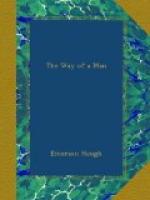“But I heard them say that the river bends far to the south not far from where we crossed. We might parallel the river if we went straight south.”
“But does not the trail cut off the bend, and run straight west?” I rejoined. Neither of us knew that the course of the north fork ran thence far to the northwest and quite away from the trail to Laramie.
Evidently our council was of little avail. We started southwest as nearly as we could determine it, and I admit that grave anxiety had now settled upon me. In that monotonous country only the sun and the stars might guide one. Now, hard as it was to admit the thought, I realized that we would be most fortunate if we saw the wagons again that night. I had my watch with me, and with this I made the traveler’s compass, using the dial and the noon mark to orient myself; but this was of small assistance, for we were not certain of the direction of the compass in which the trail lay. As a matter of fact, it is probable that we went rather west than southwest, and so paralleled both the trail and the river for more than a dozen miles that afternoon. The girl’s face was very grave, and now and again she watched me walking or trotting alongside at such speed as I could muster. My clothing was covered with blood from my wound.
I looked always for some little rivulet which I knew must lead us to the Platte, but we struck no running water until late that evening, and then could not be sure that we had found an actual water course. There were some pools of water standing in a coulee, at whose head grew a clump of wild plum trees and other straggly growth. At least here was water and some sort of shelter. I dared go no farther.
Over in the west I saw rising a low, black bank of clouds. A film was coming across the sky. Any way I looked I could see no break, no landmark, no trend of the land which could offer any sort of guidance. I wished myself all places in the world but there, and reproached myself bitterly that through my clumsiness I had brought the girl into such a situation.
“Miss Meriwether,” I said to her finally, putting my hand on the pommel of her saddle as we halted, “it’s no use. We might as well admit it; we are lost.”
CHAPTER XXV
CLEAVING ONLY UNTO HER.
She made no great outcry. I saw her bend her face forward into her hands.
“What shall we do?” she asked at length.
“I do not know,” said I to her soberly; “but since there is water here and a little shelter, it is my belief that we ought to stop here for the night.”
She looked out across the gray monotony that surrounded us, toward the horizon now grown implacable and ominous. Her eyes were wide, and evidently she was pondering matters in her mind. At last she turned to me and held out her hands for me to assist her in dismounting.
“John Cowles, of Virginia,” she said, “I am sorry we are lost.”




